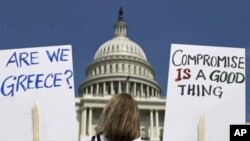For U.S. lawmakers, no issue is more pressing or contentious than how to revive an ailing American economy while confronting a $14.7 trillion national debt. Complicating this monumental task is a sharp divergence of views and recommendations from economists and budget officials on the causes and best solutions for the nation's financial woes.
Recent weeks have seen a parade of America's most-renowned economists and other experts testifying at dozens of hearings on Capitol Hill examining U.S. fiscal and financial matters from every possible angle.
If lawmakers were hoping for consensus from the nation's intelligentsia on how best to navigate perilous economic waters threatening to sink America's financial ship, they have surely been disappointed. Just as members of Congress passionately disagree on what ails the nation and what will cure it, so too do academics and officials who have dedicated their careers to studying such matters.
Consider the question of what, if anything, the U.S. government should do to promote economic growth and job creation. Economists of all stripes agree that an expanding economy will put Americans back to work and reduce budget deficits. But how to achieve that goal is a matter of intense debate.
Alice Rivlin, who served as a budget official during the Clinton administration and co-chaired President Barack Obama's deficit commission, urged lawmakers to embrace an active government role to get the economy moving.
"Unless employment accelerates sufficiently, we are doomed to stagnation and eroding standards of living," said Rivlin. "The faster we get people back to work, the easier it will be to move toward a sustainable federal budget. If the recovery stalls and unemployment rises again, prospects for stabilizing the debt will deteriorate rapidly. It will be worth some temporary increase in the near-term deficit to avoid getting into another downward spiral of falling jobs, sales, investment, and confidence."
Her words were music to the ears of Democratic lawmakers, like Maryland Congressman Elijah Cummings, who, like the president, wants Congress to approve a short-term federal jobs program.
"The debt is a nominal factor in our current economic outlook," said Cummings. "Rather, slowed hiring, low consumer confidence and demand, reduced public investment, and the continuing [real estate] foreclosure crisis are driving our economic conditions and our rising debt, rather than the other way around."
Not so, according to another economist who testified on Capitol Hill this week. J.D. Foster, a budget official under former President George W. Bush, argued the U.S. economy would soar on its own if only a burdensome federal government would let it.
"The economy abounds in opportunities for growth," said Foster. "But turning potential into reality requires confidence: confidence in the future, confidence in the specific effects of government policy. America suffers a confidence shortage, and Washington is overwhelmingly the cause."
Picking up on that theme was Carnegie Mellon University economist Allan Meltzer, who took aim at the Obama administration's call for higher taxes on the wealthy and some corporations.
"Uncertainty about future tax rates has deterred investment and slowed recovery," said Meltzer.
According to economists like Meltzer, a federal jobs program is ill-advised, as it adds to short-term deficits, raises the debt burden, and increases the likelihood of future tax increases to avoid a fiscal meltdown. Thus, the path to unlocking investment and economic expansion is maintaining current tax rates and cutting federal spending.
That view is trumpeted by Republicans, like Senator Jeff Sessions of Alabama.
"The debt level today already costs us growth and jobs," noted Sessions. "America's private sector is just waiting to grow and expand, but unwise government policy continues to stand in the way."
However, Alice Rivlin told lawmakers the real cause of America's economic doldrums is not a lack of confidence, but a nation that has stopped spending.
"Lack of demand is the basic problem," added Rivlin. "If you do not think you can sell your product, you are not going to make more of it."
Public policy groups, like the Committee for a Responsible Federal Budget, say, whatever policies or programs Washington adopts, lawmakers need to keep an eye on the main prize: stabilizing and ultimately reducing a national debt that has grown to the size of America's entire yearly economic output.
On that score, no one in Congress disagrees. But getting there when 14 million Americans are out of work and economic growth has slowed to a crawl is no easy task for lawmakers, or the experts who advise them.




